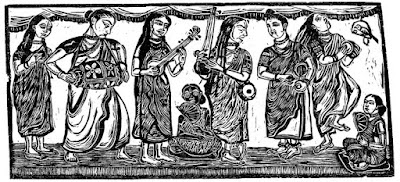 Women have a significant role in the religious and
metaphysical sadhana (seeking)
of Bauls. They are inseparable companions of the men, and Bauls insist on love
and respect for their women. "He who does not know the feeling of tender
love, must be avoided always," goes one song, and another says: "A
woman is not a treasure to be trifled with." But gender bias dies hard. Baul women (Baulanis, as they are
called), though constant companions of the men, have almost always remained in
the background - dancing, providing the rhythm and lending their voices to the
chorus. In other words, always playing second fiddle to the men. It is only
recently that they have come to the forefront.
Women have a significant role in the religious and
metaphysical sadhana (seeking)
of Bauls. They are inseparable companions of the men, and Bauls insist on love
and respect for their women. "He who does not know the feeling of tender
love, must be avoided always," goes one song, and another says: "A
woman is not a treasure to be trifled with." But gender bias dies hard. Baul women (Baulanis, as they are
called), though constant companions of the men, have almost always remained in
the background - dancing, providing the rhythm and lending their voices to the
chorus. In other words, always playing second fiddle to the men. It is only
recently that they have come to the forefront. A wandering life dependent on the charity of listeners is by
no account an easy one; and it is all the more difficult for women. But for
Baulanis, there can be no other way of life. In all their wanderings, Baulanis have never deviated from
their basic philosophy, but that has not deterred them from incorporating the
changing times in the themes of their songs. The careful listener will find
subtle differences between the songs of Baulanis and those of their male
counterparts. The modern Baulani is very much aware of her feminity, and her
songs of liberation and emancipation of the self can also be applied in the
context of the social status of women. An example of this can be found in the
words of Subhadra Sharma, a Baulani from Nadia: Kobe hobe swajal borosha rekhechhi shei bhorosha/ Kotodine jabe amar
bhagnadosha (My hopes rest on the purifying rains that will come
and liberate me.)
A wandering life dependent on the charity of listeners is by
no account an easy one; and it is all the more difficult for women. But for
Baulanis, there can be no other way of life. In all their wanderings, Baulanis have never deviated from
their basic philosophy, but that has not deterred them from incorporating the
changing times in the themes of their songs. The careful listener will find
subtle differences between the songs of Baulanis and those of their male
counterparts. The modern Baulani is very much aware of her feminity, and her
songs of liberation and emancipation of the self can also be applied in the
context of the social status of women. An example of this can be found in the
words of Subhadra Sharma, a Baulani from Nadia: Kobe hobe swajal borosha rekhechhi shei bhorosha/ Kotodine jabe amar
bhagnadosha (My hopes rest on the purifying rains that will come
and liberate me.)




No comments:
Post a Comment